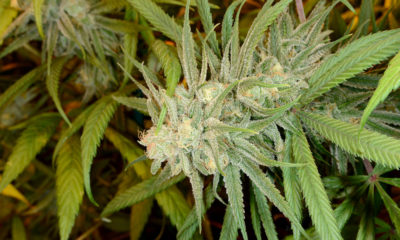
Medical
Studies on Cannabis & Bone Density Yield Conflicting Results
A recent study about the impact of cannabinoids on bone density is raising concerns about possible ill effects on long-term heavy marijuana smokers. Earlier studies, however, showed potential for certain cannabinoids in treating bone fractures. The relationship between cannabis and bone density appears complicated, with much left to research.
New research indicates that regular, heavy users of cannabis have a lower bone density and are more likely to suffer fractures than what the study called “control smokers” — that is, regular smokers of cigarettes who do not use marijuana. The study, however, appears to contradict what earlier studies have discovered about cannabis and bone density.
The research, published in the American Journal of Medicine last year, found that the bone-mineral density of heavy cannabis users was approximately 5 percent lower than that among those who smoke only cigarettes. The researchers defined “heavy cannabis users” as those who reported smoking marijuana on at least 5,000 occasions in their lifetime. For someone who has used cannabis daily for 25 years, that comes out to indulging an average of five times a day.
According to Medical News Today, the researchers— led by Prof. Stuart Ralston of the Centre for Genomic and Experimental Medicine at the University of Edinburgh — stated: “We have known for a while that the components of cannabis can affect bone cell function, but we had no idea up until now of what this might mean to people who use cannabis on a regular basis. Our research has shown that heavy users of cannabis have quite a large reduction in bone density compared with non-users, and there is a real concern that this may put them at increased risk of developing osteoporosis and fractures later in life.”
Dr. Matthew Hepinstall, an orthopaedic surgeon in New York City, remarked on the findings to HealthDay News: “The take-home point for patients is relatively clear: heavy marijuana use does not promote bone health.”
However, the research team also emphasized that they could not prove a cause-and-effect relationship between cannabis and bone density.
The study included 170 regular cannabis users and a control group of 114 cigarette smokers, mostly in their 40s.
A University of Sheffield study published in the medical journal Aging Cell in October 2017 actually delved into the mechanism by which cannabinoids affect bone density.
The study described how there are two main cannabinoid receptors in humans and most other mammals. The type 1 receptor (CB1) is mostly found in the nervous system and is thought to be responsible for regulating appetite, pain perception and motor function. The type 2 receptor (CB2), found in the body’s peripheral tissues, is linked to regulation of immune responses. An additional cannabinoid receptor, GPR55, has recently been identified as well, and is the least understood of the three.
The University of Sheffield team developed a special breed of “knockout mice” for their study — tweaked not to produce these receptors. The study found that “CB1/2 double knockout mice showed a reduced age-related bone loss and exhibited higher bone mass than wild-type mice,” one of the study’s authors wrote, in an article for Science Trends. In other words, without the receptors to process the cannabinoids, the mice appeared to have stronger bones as they aged.
However, still earlier studies have paradoxically indicated that cannabinoids may actually promote bone health in certain circumstances. In 2015, a study published in the Journal of Bone and Mineral Research found that CBD can help with healing fractures. Researchers determined that CBD increased the strength of healed femurs, after they had been broken in some unfortunate laboratory rats.
Also, in Israel in 2015, researchers found that CBD played a role in promoting bone recovery. In a combined study conducted by researchers from Hebrew University of Jerusalem and Tel Aviv University, CBD was found to enhance fracture healing by stimulating production of osteoblasts (bone-building cells). Osteoblast proliferation is critical to forming the “calluses” that bridge the fractures in broken bones. After six to eight weeks, experiments revealed that bone callus size increased in rats that were administered CBD or THC — but not in rats that were given a control substance. The study concluded that “CBD significantly enhanced the mechanical properties and strength of the bone after eight weeks.”
There is clearly a close link between cannabinoids — especially CBD — and bone formation and healing. But with seemingly contradictory findings of studies over the past years, the question certainly warrants closer scrutiny.
TELL US, did you know about the relationship between cannabis and bone density?





















